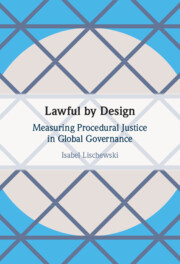2 - Theoretic Background and Methodology
Published online by Cambridge University Press: 13 January 2022
Summary
GAL is one of the most ambitious projects to capture the role of procedure in global governance. Other concepts are briefly introduced and compared. The idea of procedural justice as akin to GAL in scope but focusing on perceptions of fairness and legitimacy rather than normativity emerges.
The main strands of international relations theory regarding institutions are briefly introduced. The work focuses on rational choice, notably Rational Institutional Design theory.
To unite the concept of procedural justice with the perspective and methods of rational institutional design, the factor of state interest is studied. It is shown how state interest can operate even within nominally private institutions and which factors determine whether and how a state is interested in introducing procedural justice.
The codebook variables creating the matrix of sensitivity of state interest - quantitative and qualitative procedural density is introduced. The mode of sample collection is explained.
Keywords
- Type
- Chapter
- Information
- Lawful by DesignMeasuring Procedural Justice in Global Governance, pp. 6 - 62Publisher: Cambridge University PressPrint publication year: 2022

